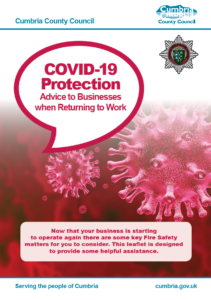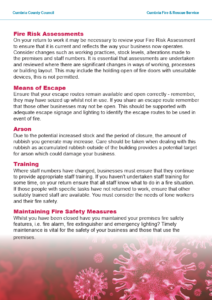It is important that, as changes are naturally made to control the spread of Covid 19, they are also considered in the context of your premise Fire Risk Assessment to help manage and mitigate the risk of fire as much as possible. Significant changes should be identified and recorded. Consider asking some simple questions:
- Risk Reduction: Have you taken all reasonable measures to reduce the risk of fire? E.g. isolating all non-essential equipment and machinery
- Fire alarm systems: Is your fire alarm system in a good working order? – ensure it remains tested regularly to ensure this.
- Interim measures: If you have had to implement some interim measures do all your staff know and understand why and what they are?
- New or emerging risk: Has risk changed? Have things been put in place as a response to the situation that have, on reflection, increased fire risk? (eg Introduction of oxygen use / storage)
- Vulnerable people: Are the most vulnerable receiving support and are Personal emergency evacuation plans (PEEPS) being conducted and reviewed to assess individual needs/ changes in their vulnerability? – who is caring for the vulnerable and can they still maintain it?
The need to review Fire Risk Assessments
Many businesses, whether they have remained open, or not, are experiencing changes in risk. In all cases, businesses should be aware of these changes in risk and review their Fire Risk Assessments (FRA) accordingly, to ensure they are suitable and sufficient. Responsible Persons (RPs) should always be reminded to seek advice from a competent fire risk assessor where doubt exists.
It may also be advisable for the RP to consult with their insurers when considering risk assessment and mitigation. It should be noted that the insurer’s role is not to determine compliance with the Regulatory Reform (Fire Safety) Order 2005 (RR(FS)O 2005), that remains with the FRS.
Scaling the Risk
Businesses which remain open are likely to experience a surge in demand. It is essential that FRAs are undertaken or reviewed where there are significant changes in ways of working or processes. This may include:
- More materials, storage requirements, or higher quantities of finished product being on site than would normally be the case.
- Parts of the premises being closed; the FRA should determine the level of risk resulting from the changes and any mitigation measures e.g. more frequent deliveries/collections or the use of other sites to provide storage.
- Where staff numbers have been increased, businesses must ensure that they continue to provide appropriate staff training. This is sometimes overlooked where employees of the same company come to work at a different site. RPs should be able to show that all personnel are aware of what to do in case of fire. They should also test their emergency procedures, particularly after large staff increases.
- Reductions in staff due to sickness and self-isolation is to be expected. While the numbers of those who are absent will be bolstered by those returning to work, in the short-term businesses should ensure that their FRA reflects the added risk of such reductions. Issues may include having insufficient staff available to carry out processes safely, increasing the risk of fire. Similarly, a reduction in staff may result in employees not being able to successfully carry out evacuations and emergency procedures such as in-house fire response or fire warden duties.
Evacuation Plan
All staff; residents and visitors must be familiar with the evacuation plan (including all temporary and bank staff). Maintaining minimum staffing levels to undertake the evacuation plan is very important. Where appropriate, PEEPS must continue to be conducted and reviewed.
Fire Alarm Actuation and Emergency Procedures
You may wish to consider adopting a version of the following process to reduce disruption, maintain fire safety and minimise the need for external persons (in this case Firefighters) to enter your premises at a time when you may be ‘shielding’ residents from preventable exposure to potential Covid 19 transmission.
- If the fire alarm activates, commence your normal emergency procedures.
- Suitably trained staff should investigate the source of the alarm seeking to establish if it is a fire or a false alarm.
- If, at any point during the investigation a fire is discovered or there is a smell of burning or smoke that cannot be accounted for, dial 999 and ask for the fire service immediately – stating that an evacuation is in progress.
- If, following the investigation, you are certain that there is no fire, and no suspicion of a fire, then the emergency procedures can be cancelled. Under these circumstances, do not call the fire service.
- The fire alarm system should be re-set by a competent member of staff and the fire alarm log book updated with a record of the event
To prevent any unnecessary disruption, please ensure that any known problems causing false fire alarms are immediately corrected, so that there is a high degree of confidence that fire alarms that do occur are genuine.
Fire Alarm Systems
Is your fire alarm system in a good working order?
It is important that fire alarm, emergency lighting and other fire safety systems (eg smoke control systems, where fitted) are maintained in good working condition at all times through the continuation of your normal testing regimes.
If your system/s are due maintenance by a qualified engineer, but you want to limit the number of visitors to your premises at this time, you may decide to delay the attendance of the engineer.
If you take this action you must record it as a significant finding in the fire risk assessment and highlight the importance of the regular tests you then undertake to ensure the system/s remain fully functional
There may still be occasions when engineers / contractors have to attend your premises to maintain essential fire safety systems. You should plan ahead for this eventuality within your Business Continuity arrangements.
If you are uncertain whether maintenance schedules can safely be extended for the system/s in your premises you should contact a qualified fire safety system engineer.
Fire Doors
Buildings are fitted with self-closing fire doors to prevent smoke and fire from spreading from one compartment to another and to protect escape routes.
Emerging intelligence suggests some building users are wedging open self-closing fire doors as a Covid 19 control measure (intended to reduce the need to touch locks and door handles etc). Whilst this is understandable in the context of the coronavirus outbreak, it is essential that this hazard is balanced against the risk of uncontrolled spread of fire and smoke when a fire occurs.
If you have decided to wedge fire doors the practice must be fully considered in the fire risk assessment and suitable control measures put in place to ensure fire doors will be closed when needed (particularly in buildings providing sleeping accommodation or care for the vulnerable).
Cumbria Fire and Rescue Service strongly advises against the practice of wedging fire doors and asks responsible persons to consider other control measures.
Buildings Not In Use
If your building is temporarily closed there are some simple measures to safeguard against both accidental and deliberate fires.
- Isolate utilities and machinery that are not required – but ensure your security/fire alarms are still operative.
- Close all fire doors.
- Don’t store combustible materials against the building and consider other measures to prevent the occurrence of arson.
- Where possible ask your local community to help keep an eye on your premises.
- Shared Means of Escape – Securing a premises should not affect the means of escape from other premises which are still open, residential buildings or where wayleave agreements are in place.
Blocks of Flats, Houses In Multiple Occupation and Student Accommodation
Fire safety within dwellings is an extremely important issue, especially in mixed use premises and where unrelated occupiers, who live independently from one another, share common areas of the same building.
Key considerations should be
- Ensure that fire safety systems, including your fire alarm and smoke control systems are in a good working, are being tested appropriately and are maintained well.
- Ensure that common areas and means of escape routes are clear from combustible items.
- Ensure refuse compounds and other storage areas are not overflowing and are not stored immediately next to buildings – minimum distance of 6m should be maintained where possible.
- Ensure that all occupiers are familiar with the building’s evacuation strategy
- Ensure that all fire safety features are maintained, i.e. fire doors are closed and not wedged open
Any change of strategy needs constant review and robust management
Now that your business is starting to operate again there are some key Fire Safety matters for you to consider. This Fire Business Leaflet Covid-19 is designed to provide some helpful assistance.

